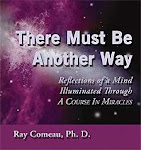Since James
Twyman is reading the Lesson of the day in his mellifluous voice, emphasizing
the rhythm of the iambic pentameter, I want to bring to your attention the
extent of the iambic pentameter in the Course.
In Lesson 97, I
am Spirit, the first three paragraphs are the last prose in the Lessons.
Today's idea identifies you with
your one Self. It accepts no split identity, nor tries to weave opposing
factors into unity. It simply states the truth. Practice this truth today as
often as you can, for it will bring your mind from conflict to the quiet fields
of peace. No chill of fear can enter, for your mind has been absolved from
madness, letting go illusions of a split identity.
We state again the truth about
your Self, the holy Son of God Who rests in you; Whose mind has been restored
to sanity. You are the spirit lovingly endowed with all your Father's Love and
peace and joy. You are the spirit which completes Himself, and shares His
function as
Creator. He is with you always, as
you are with Him.
Today we try to bring reality
still closer to your mind. Each time you practice, awareness is brought a
little nearer at least; sometimes a thousand years or more are saved. The
minutes which you give are multiplied over and over, for the miracle makes use
of time, but is not
ruled by it. Salvation is a
miracle, the first and last; the first that is the last, for it is one.
The next stanza
begins the iambic pentameter for the rest of the Lessons.
You ARE/ the SPIR/ it IN/ whose MIND/
a BIDES/
the miracle in which all time
stands still;
the miracle in which a minute
spent
in using these ideas becomes a
time
that has no limit and that has no
end.
Give, then, these minutes
willingly, and count
on Him Who promised to lay
timelessness
beside them. He will offer all His
strength
to every little effort that you
make.
Give Him the minutes which He
needs today,
to help you understand with Him
you are
the spirit that abides in Him, and
that
calls through His Voice to every
living thing;
offers His sight to everyone who
asks;
replaces error with the simple truth.
replaces error with the simple truth.
In the Text, in
Chapter 26, TheTransition, is primarily in iambic pentameter, but the last two prose
paragraphs in the Text occur in Chapter 27, The Healing of the Dream, in the
Section, Beyond all Symbols:
Power cannot oppose. For
opposition would weaken it, and weakened power is a contradiction in ideas.
Weak strength is meaningless, and power used to weaken is employed to limit. And
therefore it must be limited and weak, because that is its purpose. Power is unopposed,
to be itself. No weakness can intrude on it without changing it into something
it is not. To weaken is to limit, and impose an opposite that contradicts the
concept that it attacks. And by this does it join to the idea a something it is
not, and make it unintelligible. Who can understand a double concept, such as
"weakened-power" or "hateful-love"?
You have decided that your brother
is a symbol for a "hateful-love," a "weakened-power," and
above all, a "living-death." And so he has no meaning to you, for he
stands for what is meaningless. He represents a double thought, where half is
cancelled out by the remaining
half. Yet even this is quickly
contradicted by the half it cancelled out, and so they both are gone. And now
he stands for nothing. Symbols which but represent ideas that cannot be must stand
for empty space and nothingness. Yet nothingness and empty space can not be interference.
What can interfere with the awareness of reality is the belief that there is something
there.
Here is the poetic
stanza that begins the rest of the Text in iambic pentameter.
The PIC/ ture OF/ your BROTH/ her THAT/
you SEE/
or to deny; to love or hate, or to
kndow with power or to see as weak.
The picture has been wholly cancelled out,
because it symbolized a contradiction
that cancelled out the thought it represents.
And thus the picture has no cause at all.
Who can perceive effect without a cause?
What can the causeless be but nothingness?
The picture of your brother that you see
is wholly absent and has never been.
Let, then, the empty space it occupies
be recognized as vacant, and the time
devoted to its seeing be perceived
as idly spent, a time unoccupied.
or to deny; to love or hate, or to
kndow with power or to see as weak.
The picture has been wholly cancelled out,
because it symbolized a contradiction
that cancelled out the thought it represents.
And thus the picture has no cause at all.
Who can perceive effect without a cause?
What can the causeless be but nothingness?
The picture of your brother that you see
is wholly absent and has never been.
Let, then, the empty space it occupies
be recognized as vacant, and the time
devoted to its seeing be perceived
as idly spent, a time unoccupied.
Michael Russell was the first to
bring this to the attention of the world in his magnificent book, “Rhythm and
Reason: Prose and Poetry in A Course in
Miracles.”
